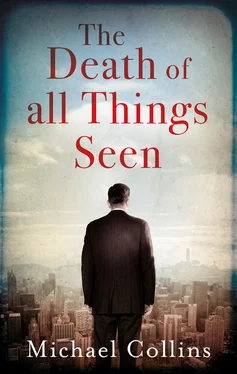It was the prophetic ending Nate had needed when he first arrived, that solitary pilgrimage into desolate lands, inhabiting the cleaving sense of how time could and did outrun the ingenuity of the best-laid plans. Oh, Canada .
*
He left Havre-Saint-Roche in the light of early morning for what was his true destination, the town of Grandshire. He extinguished his fire with the stomp of his boot, and made his way along a dirt road following a page with a map torn from the same encyclopedia.
He had read that Grandshire was a town built by an enlightened industrialist, Augustus Grandshire, a prominent socialist with progressive New England sensibilities who had transported his vision of a Utopian collective across the border into the wild Canadian backwoods.
Upon first arriving, Nate surveyed the town. It emerged from a break into a clearing of land run along a river’s edge. It survived in its shabby grandeur. In accordance with its founder’s Utopian reach, a pulp mill had been set at a distance from the residential district, so Grandshire achieved, at the time, a rarefied divide — separating the toil of one’s daily labor with the reprieve of nature.
In the town center stood the remnants of a chapel. Prayer services had been read from a belfry over a loud speaker, so when the wind blew, people forty miles away had been given to proclaiming that they could hear the word of God carried on the wind through the whispering pines.
It was not then the place it had once been, but it showed how one man’s influence could make a difference, how those who might not have fared so well could be saved by being born into a place where attitudes and ways of conduct were well-established. In a way, it reminded Nate of the influence of John F. Kennedy on his own adolescence, how the decade started with a promise of putting a man on the moon. How strange, Kennedy long dead, and Nate out in the Canadian wilds, while at the decade’s end, a man did walk on the moon, and the world knew all about the Sea of Tranquility , while, in South East Asia, war raged unabated.
How could it have been, that anomalous proposition, the claiming of a moon when there was so much yet up for grabs on Earth?
*
Nate lodged for the first few months in what had once been a plush hotel, complete with a grand tearoom with velvet-covered couches and a dance hall with draped curtains and a stage.
At the time, everyone understood what brought an American up there, and yet he was regarded with neither suspicion nor interest. Vietnam was not Canada’s war. The work at the mill kept the workers busy and attentive. The whirling bite of a blade could cut a man in two. Nate was hired and worked a year that shaped him into a man.
He met Ursula Abenakis right after he arrived. She was a twenty-two-year-old half-blood native who worked at the hotel. She met his stare with the greenest of eyes, her sallow skin framed by a black sheen of hair, betraying her lineage.
She wrote his name into a leather bound ledger, the languid sweep of her writing style suggesting a convent education. She had, in fact, been brought up in a Catholicism that never took hold. In the pulse of nature, in daily life, there was a more powerful God.
She became his fascination, this Ursula Abenakis. He took his meals at the hotel, tipping with a view to catching her attention. He watched the way she filled the pepper and salt shakers, topped up the milk jugs, turned over the damp brown sugar in the glass bowls, and at the day’s end dutifully changed the fly-strip paper.
He learned, in the coming weeks, sitting by her in the dying evenings, that her father had been a fur trapper, three-quarters First Nation and a quarter French-Canadian, as were most trappers in the region after centuries of interbreeding along the Saint Lawrence and the fur-trade routes.
Nate was fresh-faced back then, a young man destined for great things. Or so Ursula told him. It didn’t take her long to come out to the cabin he found in the fall, her housewarming gift a rhubarb pie and a pound of ground coffee beans.
At the hotel, she had called him ‘My American’, smiling with a beatific grace. He had thought her a beauty he could never possess, and he carried the thought of her in the way men carried lost dreams into battle. He loved her for her intelligence and mystery. When she poured him coffee, he felt like weeping. He thought he would never have her.
When she arrived with the rhubarb pie, she wore nylons under her jeans, but no underwear or bra. It was revealed as she removed her top and then her jeans, placing them by her side, and doing so without the slightest sense of urgency or impropriety. She observed a polite restraint in the wake of their lovemaking, which was full of struggle and passion. She never asked directly about his family, or if he might return to America. Vietnam was the reason for his being there, and yet it seemed so remote, it didn’t bear mentioning.
For her part, she revealed she was from the Anishinaabeg tribe, a name which literally meant, ‘Beings made out of nothing’, a conjuring that set Nate into a swooning sense that, yes, all came from nothing, that all things had to be envisioned and decided upon and then made real. He considered their relationship the same way, something made out of nothing.
Of course, Ursula came with a past, something before the current nothingness. She was honest, open and proud. She had been with a First Nation man, Frank Grey Eyes, born into the Wolf Clan, a ponytailed, equine-faced native with wolf eyes and a temper. He wore a black bowler hat and a poncho. His favorite things in the whole world were scratch lottery tickets and booze. This was where mystery and revelation had gone, or so he believed.
They had ventured to Toronto in 1968 so Frank could work construction, but Frank couldn’t handle the booze or the loneliness and, though he complained that Toronto was killing him, he stayed and got attached to white women in bars where his kind fell easy prey to women on the way down, white women who held a certain allure of what non-white males felt was a conquest, a victory of sorts. It just exacerbated the decline, because it felt like something other than it was, when it was nothing but the end.
When Frank was sad he used to trace the outline of a circle around himself, shuffling in a circular, tribal, tomahawk-wielding dance, a slow vortex spun against the spin of the cosmos, as though he could create some concept of home. He wore his bowler hat, so it was sobering, sad and moving to witness him dance in the dark of the apartment.
Sometimes he scratched a lottery ticket, the silver filings sifting through the air like a spell. He was looking for small, contained miracles. He was fascinated, too, by fortune cookies. He felt revelation was hiding in the most unlikely places, and that you had to work against the petulance of the spirit world. Toronto seemed like a place that the spirit world might inhabit. It was worth a look.
Frank was good like that in understanding the ways of the spirit world. But it was white women that destroyed him. They didn’t understand his energy. They could reach in and tear his heart out. There was no magic against white women. Frank was helpless. They passed right through the circle.
The last time Ursula saw Frank he was in a Drunk Tank. He called her not by Ursula, a Christian name bestowed upon her, but by a native name, which translated meant, ‘Something Good Cooking by a Fire’.
Frank was bestowing a grace on her, releasing her. His face and nose were smashed in. He kept drawing an invisible circle around himself so the cops thought he was nuts.
Ursula watched him through a one-way mirror before she left for the last time. She drew a circle around herself. Then she was gone. She took a bus back home in the magic of her aura, and so ended the summative history of what had been almost three years of her life.
Читать дальше












